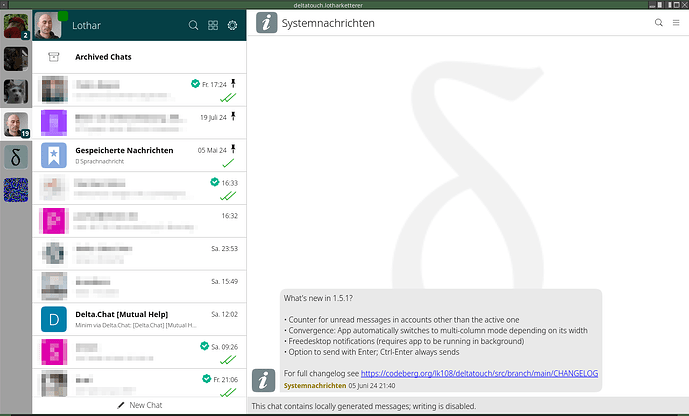I’m a bit unsure about the purposes of the nine crates deltachat_derive, deltachat-time, format-flowed, ratelimit, deltachat_ffi, deltachat-jsonrpc, deltachat-rpc-server, deltachat-repl, deltachat-contact-tools. I don’t think the core depends on them; some of the clients seem to depend on some of them (it seems deltachat-cursed depends on bindings from the deltachat-rpc-server crate, for instance, and that Deltachat-desktop might need deltachat-jsonrpc), but I’m unsure of the details, even after reading the readmes here.
Clients that might work in Debian
All clients depend on deltachat-rust-core. Some depend on some of the the nine other Deltachat crates listed above. Otherwise, if I’ve understood correctly:
Deltatouch (QML & C++) was originally designed for Ubuntu Touch, but can run on Debian and Mobian, using only deps already in Debian. It is still in the process of being adapted for Mobian, but quite usable. It is officially-supported[correction: endorsed].
Kdeltachat (also QML & C++) can run on Debian and Mobian, also using only deps already in Debian. It does not yet have all the features of some of the other clients, but it is quite usable. It is in use on Pinephones, probably on Mobian, and the interface works well on mobile.[1][2]
Deltachat-cursed (Python) is a command-line client. It is still implementing some features.
Deltachat-desktop (Typescript) has 600-odd npm deps (list of Deltachat-desktop’s npm deps). The core has more, and wasn’t as bad as it looked, so I guess I could got through the deltachat-desktop deps and see how many aren’t in Debian, but at first glance it seems like “too many”, and there are other clients available. [edit: Deltachat-desktop is fully convergent and works just fine on mobile, too.]
There is also the Debian-Mobian convergence goal; I suspect, subject to correction, that it might be easier to make the mobile clients UIs adaptively desktop-friendly than to make the dedicated desktop client work on mobile.
I think the other clients are all Android or iOS-specific, or not in active development (Kdeltachat was last updated in January, Deltachat-cursed in April, the rest within the last week). If I’ve missed anything, please let me know.
